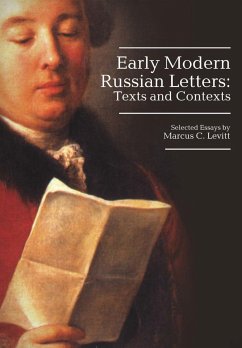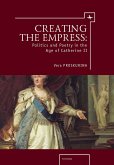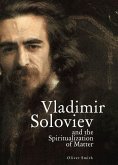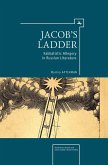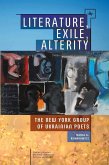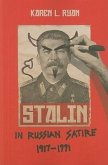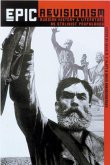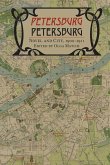- Broschiertes Buch
- Merkliste
- Auf die Merkliste
- Bewerten Bewerten
- Teilen
- Produkt teilen
- Produkterinnerung
- Produkterinnerung
Brings together twenty essays by Marcus C. Levitt, a leading scholar of eighteenth-century Russian literature. The essays address a spectrum of works and issues that shaped the development of modern Russian literature, from authorship and philosophy to gender and religion in Russian Enlightenment culture.
Andere Kunden interessierten sich auch für
![Creating the Empress Creating the Empress]() Vera ProskurinaCreating the Empress37,99 €
Vera ProskurinaCreating the Empress37,99 €![Vladimir Soloviev and the Spiritualization of Matter Vladimir Soloviev and the Spiritualization of Matter]() Oliver SmithVladimir Soloviev and the Spiritualization of Matter54,99 €
Oliver SmithVladimir Soloviev and the Spiritualization of Matter54,99 €![Jacob's Ladder Jacob's Ladder]() Marina AptekmanJacob's Ladder42,99 €
Marina AptekmanJacob's Ladder42,99 €![Literature, Exile, Alterity Literature, Exile, Alterity]() Maria G RewakowiczLiterature, Exile, Alterity31,99 €
Maria G RewakowiczLiterature, Exile, Alterity31,99 €![Stalin in Russian Satire, 1917a 1991 Stalin in Russian Satire, 1917a 1991]() Karen L RyanStalin in Russian Satire, 1917a 199128,99 €
Karen L RyanStalin in Russian Satire, 1917a 199128,99 €![Epic Revisionism Epic Revisionism]() Epic Revisionism28,99 €
Epic Revisionism28,99 €![Petersburg/Petersburg Petersburg/Petersburg]() Petersburg/Petersburg39,99 €
Petersburg/Petersburg39,99 €-
-
-
Brings together twenty essays by Marcus C. Levitt, a leading scholar of eighteenth-century Russian literature. The essays address a spectrum of works and issues that shaped the development of modern Russian literature, from authorship and philosophy to gender and religion in Russian Enlightenment culture.
Hinweis: Dieser Artikel kann nur an eine deutsche Lieferadresse ausgeliefert werden.
Hinweis: Dieser Artikel kann nur an eine deutsche Lieferadresse ausgeliefert werden.
Produktdetails
- Produktdetails
- Verlag: Academic Studies Press
- Seitenzahl: 440
- Erscheinungstermin: 30. Mai 2018
- Englisch
- Abmessung: 234mm x 156mm x 23mm
- Gewicht: 621g
- ISBN-13: 9781618118080
- ISBN-10: 1618118080
- Artikelnr.: 52640199
- Herstellerkennzeichnung
- Libri GmbH
- Europaallee 1
- 36244 Bad Hersfeld
- gpsr@libri.de
- Verlag: Academic Studies Press
- Seitenzahl: 440
- Erscheinungstermin: 30. Mai 2018
- Englisch
- Abmessung: 234mm x 156mm x 23mm
- Gewicht: 621g
- ISBN-13: 9781618118080
- ISBN-10: 1618118080
- Artikelnr.: 52640199
- Herstellerkennzeichnung
- Libri GmbH
- Europaallee 1
- 36244 Bad Hersfeld
- gpsr@libri.de
Marcus Levitt (Ph.D. Columbia University, 1984) is an Associate Professor in the Department of Slavic Languages and Literatures, University of Southern California. Dr. Levitt is known for both his work on eighteenth-century Russian culture and on Pushkin. Major publications include: Russian Literary Politics and the Pushkin Celebration of 1880 (Cornell University Press 1989), Early Modern Russian Writers, Late Seventeenth and Eighteenth Centuries, (Volume 150) in the series The Dictionary of Literary Biography (1995; Editor and contributor) and Making Russia Visible: The Status of the Visual in Eighteenth-century Russian Literature (forthcoming).
Foreword. Part One: SUMAROKOV AND THE LITERARY PROCESS OF HIS TIME. Preface. 1. Sumarokov: Life and Works. 2. Sumarokov
s Reading at the Academy of Sciences Library. 3. Censorship and Provocation: The Publishing History of Sumarokov
s
Two Epistles
. 4. Slander, Polemic, Criticism: Trediakovskii
s
Letter from a Friend to a Friend
of 1750 and the Problem of Creating Russian Literary Criticism. 5. Sumarokov
s Russianized
Hamlet
: Texts and Contexts. 6. Sumarokov
s Drama
The Hermit
: On the Generic and Intellectual Sources of Russian Classicism. 7.
The First Russian Ballet
: Sumarokov
s
Sanctuary of Virtue
(1759) Defining a New Dance. 8. Was Sumarokov a Lockean Sensualist? On Locke
s Reception in Eighteenth-Century Russia. 9. Barkoviana and Russian Classicism. 10. The Illegal Staging of Sumarokov
s Sinav and Truvor in 1770 and the Problem of Authorial Status in Eighteenth-Century Russia. 11. Sumarokov and the Unified Poetry Book: His Triumphal Odes and Love Elegies Through the Prism of Tradition. 12. The Barbarians among Us, or Sumarokov
s Views on Orthography. Early Modern Russian Letters: Part Two: VISUALITY AND ORTHODOXY IN EIGHTEENTH-CENTURY RUSSIAN CULTURE. Preface.13. The Rapprochement between
Secular
and
Religious
in Mid to Late Eighteenth-Century Russian Culture. 14. The
Obviousness
of the Truth in Eighteenth-Century Russian Thought. 15. The Theological Context of Lomonosov
s
Evening
and
Morning Meditations on God
s Majesty
. 16. The Ode as Revelation: On the Orthodox Theological Context of Lomonosov
s Odes. 17. An Antidote to Nervous Juice: Catherine the Great
s Debate with Chappe d
Auteroche over Russian Culture. 18. The Polemic with Rousseau over Gender and Sociability in E. S. Urusoväs Polion (1774). 19. Virtue Must Advertise: Self Presentation in Dashkoväs Memoirs. 20. The Dialectic of Vision in Radishchev
s Journey from Petersburg to Moscow. Sources
s Reading at the Academy of Sciences Library. 3. Censorship and Provocation: The Publishing History of Sumarokov
s
Two Epistles
. 4. Slander, Polemic, Criticism: Trediakovskii
s
Letter from a Friend to a Friend
of 1750 and the Problem of Creating Russian Literary Criticism. 5. Sumarokov
s Russianized
Hamlet
: Texts and Contexts. 6. Sumarokov
s Drama
The Hermit
: On the Generic and Intellectual Sources of Russian Classicism. 7.
The First Russian Ballet
: Sumarokov
s
Sanctuary of Virtue
(1759) Defining a New Dance. 8. Was Sumarokov a Lockean Sensualist? On Locke
s Reception in Eighteenth-Century Russia. 9. Barkoviana and Russian Classicism. 10. The Illegal Staging of Sumarokov
s Sinav and Truvor in 1770 and the Problem of Authorial Status in Eighteenth-Century Russia. 11. Sumarokov and the Unified Poetry Book: His Triumphal Odes and Love Elegies Through the Prism of Tradition. 12. The Barbarians among Us, or Sumarokov
s Views on Orthography. Early Modern Russian Letters: Part Two: VISUALITY AND ORTHODOXY IN EIGHTEENTH-CENTURY RUSSIAN CULTURE. Preface.13. The Rapprochement between
Secular
and
Religious
in Mid to Late Eighteenth-Century Russian Culture. 14. The
Obviousness
of the Truth in Eighteenth-Century Russian Thought. 15. The Theological Context of Lomonosov
s
Evening
and
Morning Meditations on God
s Majesty
. 16. The Ode as Revelation: On the Orthodox Theological Context of Lomonosov
s Odes. 17. An Antidote to Nervous Juice: Catherine the Great
s Debate with Chappe d
Auteroche over Russian Culture. 18. The Polemic with Rousseau over Gender and Sociability in E. S. Urusoväs Polion (1774). 19. Virtue Must Advertise: Self Presentation in Dashkoväs Memoirs. 20. The Dialectic of Vision in Radishchev
s Journey from Petersburg to Moscow. Sources
Foreword. Part One: SUMAROKOV AND THE LITERARY PROCESS OF HIS TIME. Preface. 1. Sumarokov: Life and Works. 2. Sumarokov
s Reading at the Academy of Sciences Library. 3. Censorship and Provocation: The Publishing History of Sumarokov
s
Two Epistles
. 4. Slander, Polemic, Criticism: Trediakovskii
s
Letter from a Friend to a Friend
of 1750 and the Problem of Creating Russian Literary Criticism. 5. Sumarokov
s Russianized
Hamlet
: Texts and Contexts. 6. Sumarokov
s Drama
The Hermit
: On the Generic and Intellectual Sources of Russian Classicism. 7.
The First Russian Ballet
: Sumarokov
s
Sanctuary of Virtue
(1759) Defining a New Dance. 8. Was Sumarokov a Lockean Sensualist? On Locke
s Reception in Eighteenth-Century Russia. 9. Barkoviana and Russian Classicism. 10. The Illegal Staging of Sumarokov
s Sinav and Truvor in 1770 and the Problem of Authorial Status in Eighteenth-Century Russia. 11. Sumarokov and the Unified Poetry Book: His Triumphal Odes and Love Elegies Through the Prism of Tradition. 12. The Barbarians among Us, or Sumarokov
s Views on Orthography. Early Modern Russian Letters: Part Two: VISUALITY AND ORTHODOXY IN EIGHTEENTH-CENTURY RUSSIAN CULTURE. Preface.13. The Rapprochement between
Secular
and
Religious
in Mid to Late Eighteenth-Century Russian Culture. 14. The
Obviousness
of the Truth in Eighteenth-Century Russian Thought. 15. The Theological Context of Lomonosov
s
Evening
and
Morning Meditations on God
s Majesty
. 16. The Ode as Revelation: On the Orthodox Theological Context of Lomonosov
s Odes. 17. An Antidote to Nervous Juice: Catherine the Great
s Debate with Chappe d
Auteroche over Russian Culture. 18. The Polemic with Rousseau over Gender and Sociability in E. S. Urusoväs Polion (1774). 19. Virtue Must Advertise: Self Presentation in Dashkoväs Memoirs. 20. The Dialectic of Vision in Radishchev
s Journey from Petersburg to Moscow. Sources
s Reading at the Academy of Sciences Library. 3. Censorship and Provocation: The Publishing History of Sumarokov
s
Two Epistles
. 4. Slander, Polemic, Criticism: Trediakovskii
s
Letter from a Friend to a Friend
of 1750 and the Problem of Creating Russian Literary Criticism. 5. Sumarokov
s Russianized
Hamlet
: Texts and Contexts. 6. Sumarokov
s Drama
The Hermit
: On the Generic and Intellectual Sources of Russian Classicism. 7.
The First Russian Ballet
: Sumarokov
s
Sanctuary of Virtue
(1759) Defining a New Dance. 8. Was Sumarokov a Lockean Sensualist? On Locke
s Reception in Eighteenth-Century Russia. 9. Barkoviana and Russian Classicism. 10. The Illegal Staging of Sumarokov
s Sinav and Truvor in 1770 and the Problem of Authorial Status in Eighteenth-Century Russia. 11. Sumarokov and the Unified Poetry Book: His Triumphal Odes and Love Elegies Through the Prism of Tradition. 12. The Barbarians among Us, or Sumarokov
s Views on Orthography. Early Modern Russian Letters: Part Two: VISUALITY AND ORTHODOXY IN EIGHTEENTH-CENTURY RUSSIAN CULTURE. Preface.13. The Rapprochement between
Secular
and
Religious
in Mid to Late Eighteenth-Century Russian Culture. 14. The
Obviousness
of the Truth in Eighteenth-Century Russian Thought. 15. The Theological Context of Lomonosov
s
Evening
and
Morning Meditations on God
s Majesty
. 16. The Ode as Revelation: On the Orthodox Theological Context of Lomonosov
s Odes. 17. An Antidote to Nervous Juice: Catherine the Great
s Debate with Chappe d
Auteroche over Russian Culture. 18. The Polemic with Rousseau over Gender and Sociability in E. S. Urusoväs Polion (1774). 19. Virtue Must Advertise: Self Presentation in Dashkoväs Memoirs. 20. The Dialectic of Vision in Radishchev
s Journey from Petersburg to Moscow. Sources

